At BURST we already started diving into the topic of sustainable water management: we brought you a material discussing comprehensive solutions to the global water crisis in theory, and also interviewed a research organisation on the palette of nature based solutions for managing water scarcity and on the prospects of using them in the public and private sphere. We continue the topic with the practice: for this month’s feature we talked with Erwin Nolde, electrical and environmental engineer, founder and managing director of Nolde – Innovative Water Concepts Ltd. based in Berlin, Germany; who have been working on designing and implementing sustainable water treatment plants for the last 25 years. His latest project is the water and heat recycling system of a 450-bed student housing in Berlin, we explore the topic through this major investment.
BURST: Erwin, could you explain the project to us in a nutshell?
Erwin Nolde: We are talking about a major investment in the Berlin-Pankow neighbourhood. Design of a 450-bed student housing started in 2019 and finished in spring of 2022, for which we were requested to prepare and implement a water recycling system. We have designed a system of greywater recycling with integrated heat recovery, which results in using exclusively treated greywater for toilet flushing and using the thermal energy from greywater for water heating, ending up in saving 40% of the water originally needed for the building and saving 30% of the energy needed – which are high numbers! As for the greywater treatment, we collect the water from the showers and hand washbasins and treat it with a system installed in the basement. The greywater is first freed from coarse pollutants using a sieve, which then enters the biological purification process where the organic matter is degraded with the help of microorganisms. Further filtration follows and UV treatment is finally used for disinfection. The treated greywater is suitable for toilet flushing, laundry and irrigation of the garden. Greywater from the showers has a temperature of over 30 °C, making it usable for heat recovery. In order to do so, at a certain stage of the treatment process, the greywater passes through a heat exchanger. The treatment plant can be monitored and operated centrally, there is no need for permanent technical maintenance.
If no maintenance is needed, how do you make sure that the plant is operating flawlessly?
We carry out very intensive monitoring in our plants, which data can be followed-up digitally. I know, for example, that in the last 24 hours we treated 17,000 litres of greywater to high-quality service water and that, including heat recovery, only needed 24 kWh of electricity and at the same time have gained 114 kWh of heat from greywater. This means that we have an energy-positive wastewater treatment plant that generates 5 times more energy than what it needs for operation, including all the components that go into it. It covers appr. 30% of the energy needed for heating water – this heat is most welcome, especially in view of the high gas prices.
This student housing was built by the state-owned Berlinovo Immobilien Gesellschaft mbH, and many times we hear that it is difficult to persuade the authorities on involving circular water treatment as a concept. How did you get involved in this project, what is the trick here? Are there differences between the public and private sphere in their aptitude to design buildings with innovative water concepts?
The usual situation is that investments in the construction sector should be as low as possible, operating costs are rarely the focus in this phase. Owner-managed hotels, operators of student residences or private building groups are often interested in low operating costs – in other words, investors who then achieve a monetary advantage themselves through innovative water concepts are the main drivers at the moment. So, this is the trick here.
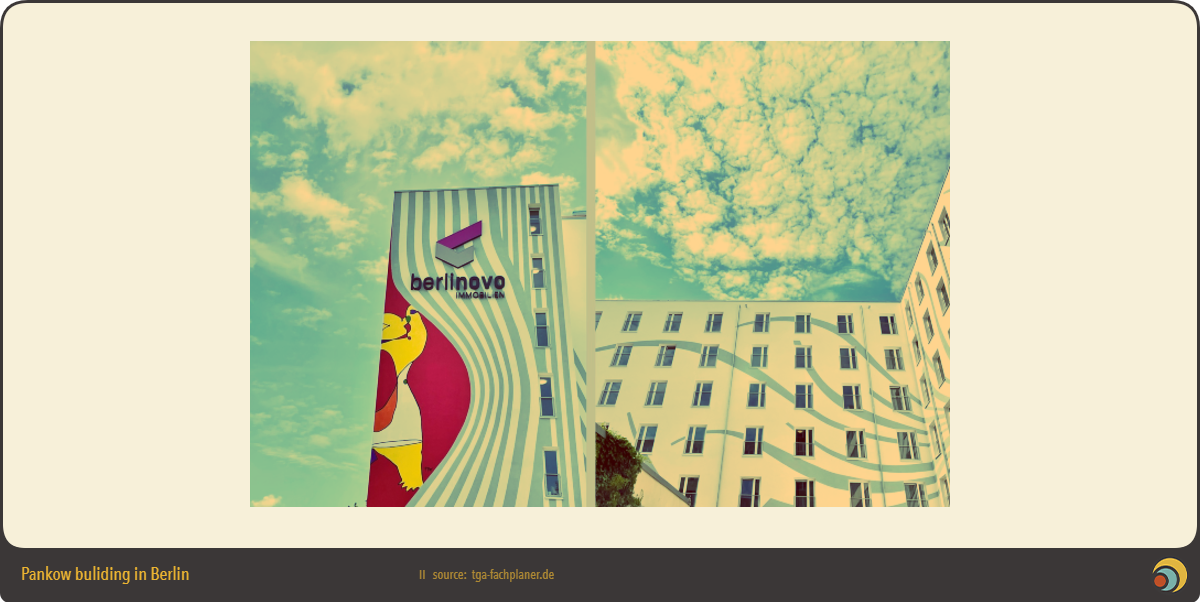
In general we can say that convincing people of implementing circular water treatment plants is a long way and lots of patience is needed. The difficulty is that we have to or want to convince people who are usually anchored in a very comfortable position. They want everything to stay the same and at the same time hope that this will make things better – which is impossible. While we have to do this persuasion work unpaid, our counterparts are usually sitting in well-paid positions. By the way, I have never experienced this as a sacrifice – but rather as happiness. Finding a job that you can fully identify with and that is fun at work – that is the essential trick to find the patience and perseverance needed.
You explained the engineering solution used in this student housing project, is this something that could be transferred to other locations? What can we say about the refurbishment of already existing buildings with a circular water treatment approach?
It depends on the building. Usually, it is a bit more difficult to install the second pipe network in existing buildings, but there are sometimes quite simple solutions. In Germany, we have been promoting separate water collection for more than 30 years for every new building and renovation, unfortunately with low success. For me it is especially difficult to understand the need for convincing in the case of new buildings. The additional investment for a second pipe network and for greywater recycling for a larger apartment building is ca. 20 € per square metre of living space. If you consider that a square metre of living space is sold at 6,000 or even 10,000 €, 20 € for significant water and heat savings later are absolutely insignificant cost.
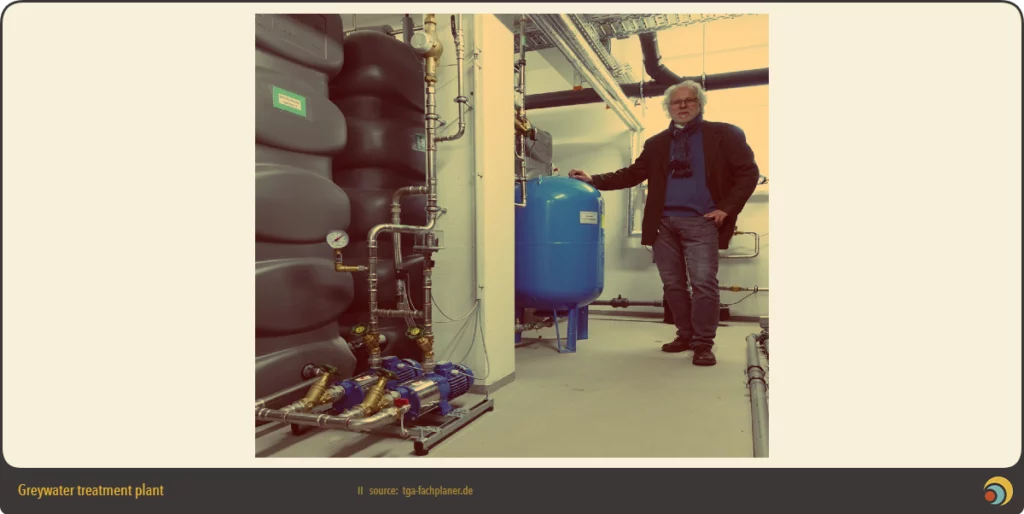
In the video you mention that nutrients can be gained from the wastewater as well – could you elaborate on that?
Recovering nutrients can be done from the so-called blackwater, which is the toilet wastewater, and its separation and recycling are urgently needed. Its volume is about 30% of the collected wastewater, containing 70 to 90% of the plant nutrients that we urgently need for agriculture, like phosphorus, which is needed for life on earth. Phosphorus resources are already very scarce, without recycling this will lead to conflicts over this nutrient. Some countries, like China, have already imposed an export ban. Only by separating greywater and blackwater already in the building can we use these resources effectively, so the greywater recycling should be completed by blackwater treatment plants as well.
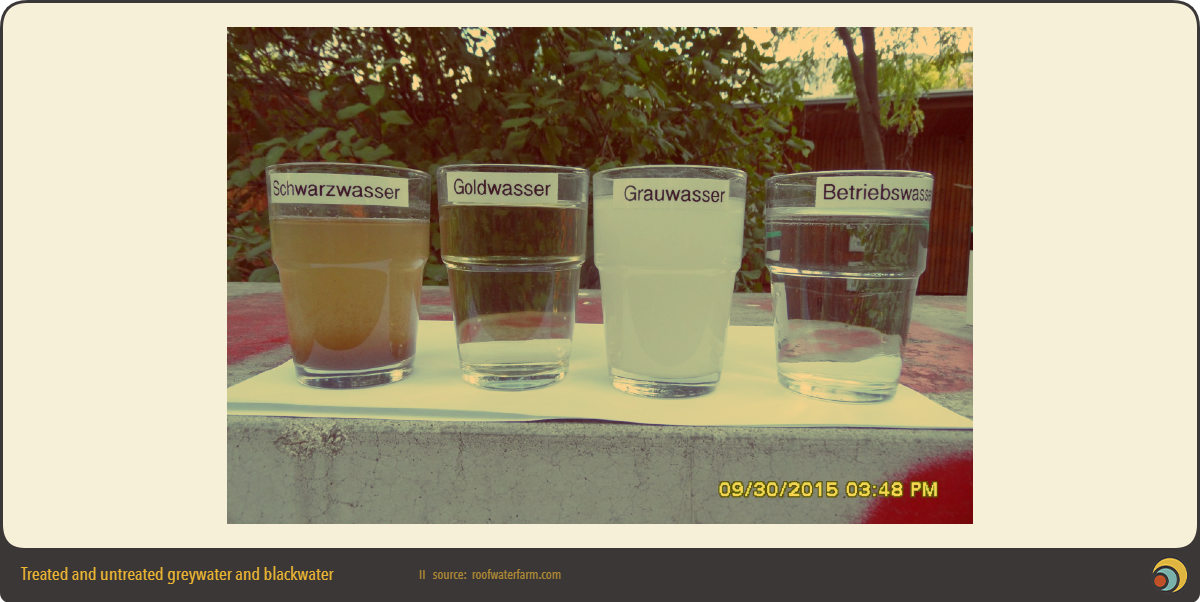
Considering all, could you list the “ingredients” of a successful water treatment investment?
The ingredients for a successful investment are usually given when innovative water concepts are incorporated into the planning at a very early stage. Instead of just looking for the cheapest offer another key aspect is to carefully plan the longevity of the technology and the necessary maintenance and operating costs. The system should consume as little electricity as possible and also no chemicals. In our work we focused on developing such technologies, like the moving bed bioreactor process. Technologies that are presented quite well in a brochure can turn out to be a bad investment in practice if, for example, the plant can be easy damaged by the introduction of interfering substances like bath oil, household chemicals, paint residues from renovation work etc.
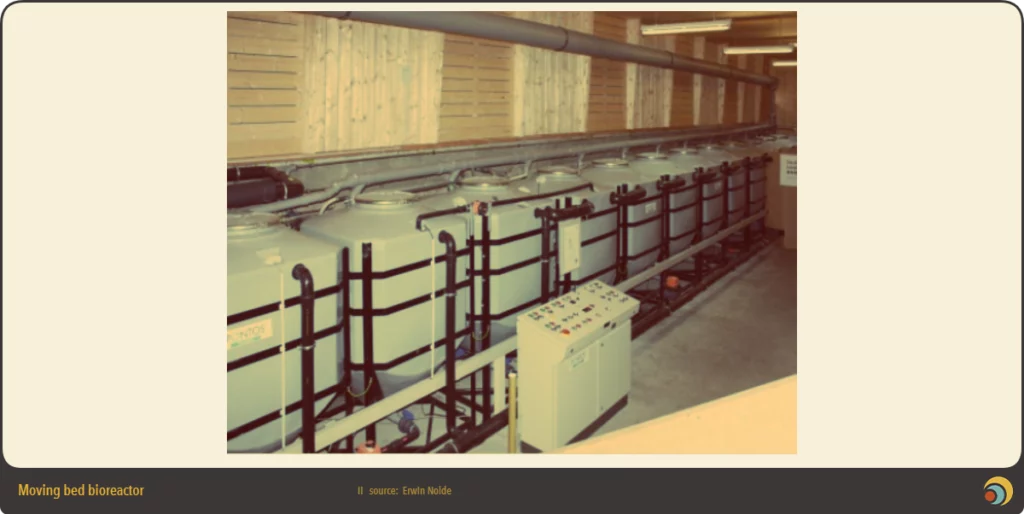
To what extent do you consider the circular water treatment systems you build as nature- based solutions?
We work according to the motto: every kWh of energy saved and every cubic metre of wastewater or drinking water saved is more valuable than every unit that has to be produced anew using energy, chemicals, etc. – Following nature’s principle: it does not produce wastewater that needs to be disposed of, thus 100% recycling is what we should aim for.
Nature does not provide for groundwater extraction or even drainage and in the flat countryside, there is virtually no surface runoff. As far as the water quantity balance is concerned, e.g. for Berlin, a nature-based system rainwater management system must evaporate appr. 80% of the precipitation water and allow 20% clean precipitation water to seep away. We need to come as close as possible to these natural conditions – in this regard we implement nature-based solutions.
What does the future bring for circular water treatment?
Climate change is a reality and can be felt by everyone in Europe – there is a lack of cooling, especially in the cities, and a lack of healthy greenery. We can only serve both if we have more water available, and in most cases this water can only be provided through water recycling and a different way of dealing with precipitation water – rainwater, stormwater, dew, etc. In my opinion, greywater recycling should have been mandatory long ago and hopefully will be in the future. Today the technology is available, has proven successful and is relatively low-cost – thus anyone who does not implement a second pipe network, greywater recycling and probably also heat recovery in a new building or renovation project commits a building sin that can only be corrected in the next 20 or 30 years with increased effort. The practice shows that with the recent gas and electricity prices skyrocketing, people “finally” have the reason to think of saving energy: nowadays we have calls every day to think of water- and energy saving solutions, compared to the last years when we had to reach out and persuade.
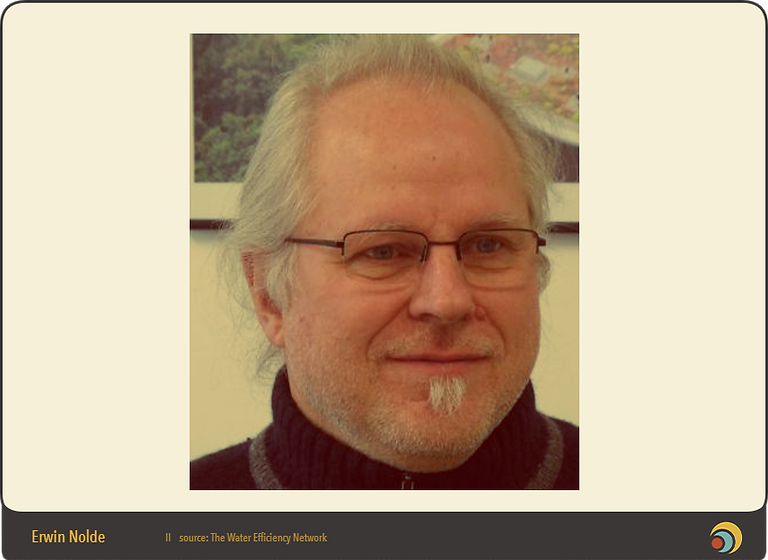
Erwin Nolde, founder and managing director of Nolde & Partner – Innovative Waterconcepts Ltd. based in Berlin, Germany. Erwin is both an electrical and an environmental engineer with 25 years expertise in the field of sustainable water and wastewater management. He is specialised in the planning, design and implementation of decentralised water and wastewater recycling systems in combination with heat recovery from greywater, besides project expertise in decentralised rainwater management schemes.
Apart from the company’ ventures, Erwin acts as a consultant for public authorities, industry, NGOs, housing associations and private house owners. Prior to that, he spent over 10 years in intensive greywater research and development at the Technical University of Berlin. Erwin is co-founder of the German Association for Rainwater Harvesting and Water Reuse (fbr) and an active member of several DIN (German Institution for Standardisation) and DWA (German Association for Water, Wastewater and Waste) working groups, including the New Alternative Sanitation Systems (NASS) group. source: The Water Efficiency Network
